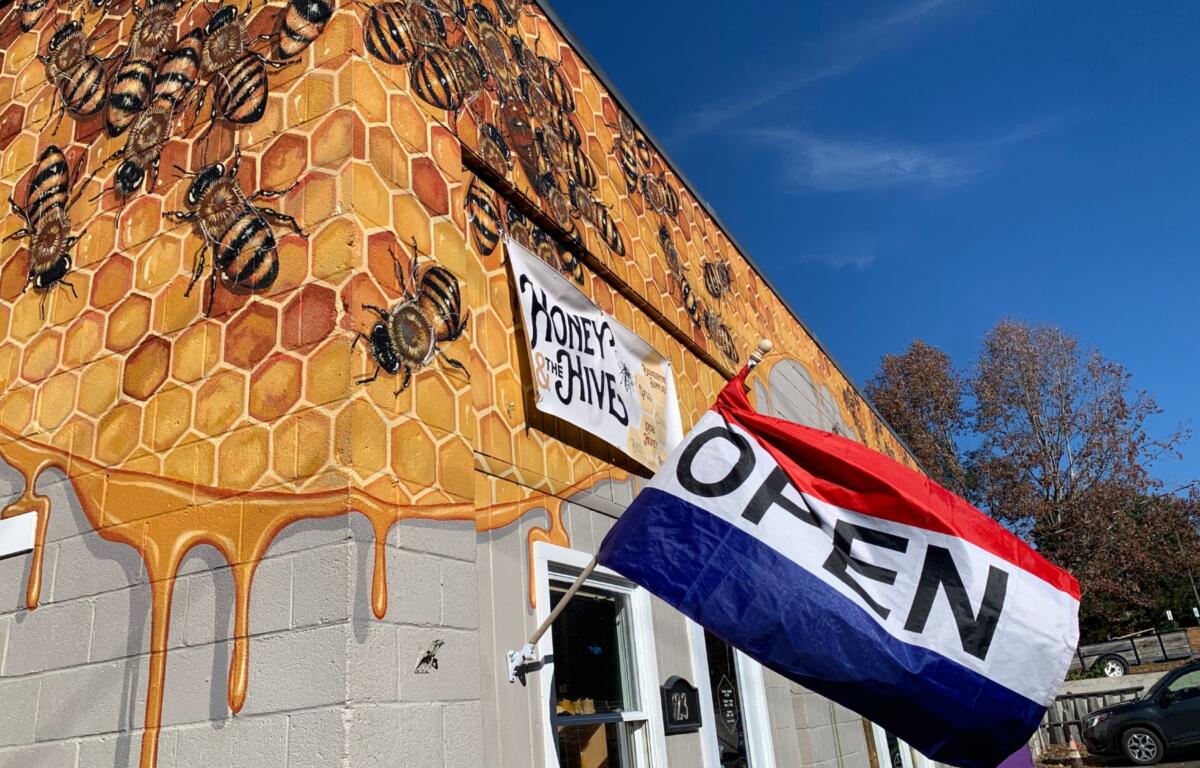WEAVERVILLE, N.C. (828newsNOW) — Beekeepers in Western North Carolina have had a historically catastrophic year – and not only because of Hurricane Helene. Environmental changes have dealt a stinging hand to apiaries throughout the southern Appalachian Mountains.
“Even before the storm, it’s been a rough year for bees because of the weather,” said Amber Shehan, the new manager at Honey & the Hive in Weaverville. She was onboarded in 2017 as the marketing and e-commerce specialist.
Honey & the Hive is a triple-threat operation, serving as something of a Tractor Supply-type store for beekeepers — teaching beekeeping and other related courses onsite and selling honey to residents and local businesses.

Shehan assumed the role of office manager under the worst of circumstances. As was reported nationally by outlets like People and internationally by The Guardian, Knox Petrucci, the previous manager, his finance, Alison Wisely, and her 9- and 7-year-old sons died in the flooding from Hurricane Helene on Sept. 27. Shehan also confirmed their deaths.
Petrucci and Wisely had met while working at Honey & the Hive. When Wisely, the then manager stepped down, Petrucci filled it.
The funeral was held on Nov. 9, the date Petrucci and Wisely had planned to wed.
Their unexpected deaths left Honey & the Hive in an unenviable position, having to restart its operations without a key figure. While their storefront was unharmed, the community was torn.
“We’re gonna keep going,” said Shehan, who has risen to fill Petrucci’s role. “We are planning on … building a little pollinator garden here at the store in their honor.”

Hurricane Helene was the final sting in an already bitter year for beekeepers in Western North Carolina. “It’s the worst year we’ve seen in a while,” Shehan lamented.
Honey & the Hive has been working closely with N.C. State to assess the sticky situation with the storm’s aftermath and the erratic weather of 2024.
N.C. State has been surveying larger than average quantities of bees leaving the hive this year, according to Shehan.
“They’re swarming,” she stated.
This is of particular concern because bees are abandoning the hives that beekeepers have cultivated in safe areas and are building new hives in non-beekeepers’ back gardens or sheds where they had not wanted bees.

Since the storm, N.C. State and Western North Carolina beekeepers, from whom Honey & the Hive buys its honey and wax, have been deeply concerned about the effects of bees drinking the river water. Polluted water can have adverse health effects on bee populations just as it does on humans, according to Shehan.
Honey & the Hive has partnered with N.C. State to help distribute emergency supplies to Western North Carolina beekeepers to attempt to save their colonies.
“Our first efforts were to try to get resources to beekeepers,” Shehan said, primarily doing so by sending bee suits to their partners.
A store down the road distributed sugar for bees. In the spring, Honey & the Hive may help N.C. State distribute live bees, too.
Other organizations backing the beekeepers of the mountains hail from the Piedmont and Coastal Plains areas.
“Eastern North Carolina beekeeping groups have been adopting Western North Carolina beekeepers,” said Shehan, who mentioned the chapters are sending anything from chainsaws to bee boxes.

Shehan has no doubt the commercial honey retailers of Western North Carolina will recover.
“(They’ll) rebound and recover,” she said assuredly.
It is the hobbyists Shehan fears for.
Honey & the Hive offers beginning beekeeping classes, four-hour lectures taught every few months, to multiply the non-professional beekeepers in our neck of the state.
“It’s kind of a crash course on everything you need to start,” Shehan explained.
The next class is set for Dec. 7.
The store also offers all the supplies a novice beekeeper would need to get started, sold in person and on its website. Items include bear fencing, hives, pest control, suits and jackets of all sizes, including for children, and nearly two dozen books on how to be a successful beekeeper.
“We have a full stock of beekeeping supplies,” Shehan said. “We try to keep a wide variety (because) … what works in Arizona or Australia may not work here.”
Honey & the Hive may soon carry its own honey, too. Shehan said her team has been working on growing their own apiaries. For now, though, the store bottles Appalachian honey, selling it by area “So people know exactly where it’s coming from.” Knowing where honey is sourced is important for people who believe local honey helps with their allergies.
“A lot of people swear by it,” she said.
Honey & the Hive offers free honey samples to patrons at the Weaverville storefront, helping them find their preferred variety. She refers to the store as “just kind of a boutique.” Other items populating the shelves include locally sourced handmade jewelry, wax candles made by store staff and Infruition Tea from Pisgah Brewing Co.
Just as for the rest of Appalachia, Hurricane Helene dealt a major blow to the beekeeping hobby and business, but the spirit of hope is alive and well. As Shehan’s former boss often told her, “You’re not really a beekeeper until you lose a hive.” Helene might have made a lot of new beekeepers.


